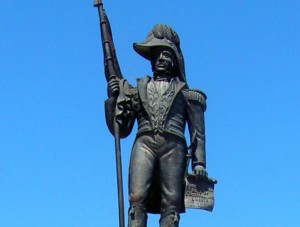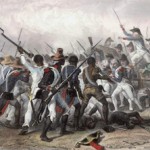Dessalines’ Ideal of Equality for Haiti
By Michel-Ange Cadet
Haiti Chery
The last clouds of smoke dissipate after the deafening sounds of cannons at Vertières. Bodies, bruised, bloodied, are spread out on the road. Streams of bloods mix with the torrential rains and flow to the gutters. Despite this macabre scene, an army of black men, their hands covered with the blood of their victims, their former tormentors, brandish their guns. Traces of gunpowder mix with their own blood and their sweat. Their lungs expel loud cries of determination. This exaltation speaks volumes for an entire people, an entire nation buried so long under the yoke of oppression and the contempt of a great European power. They are cries of deliverance, hope and freedom. This is the dream of an entire nation, crystallized around a human ideal. A former field slave who had experienced all the hardships of slavery, colonization and exploitation of blacks in the colony of Saint Domingue (Haiti), a slave who had felt in his own flesh the horrors of an oppressive regime, would thereby stand ready to defend, for the rest of his life, the principles of freedom: Dessalines!
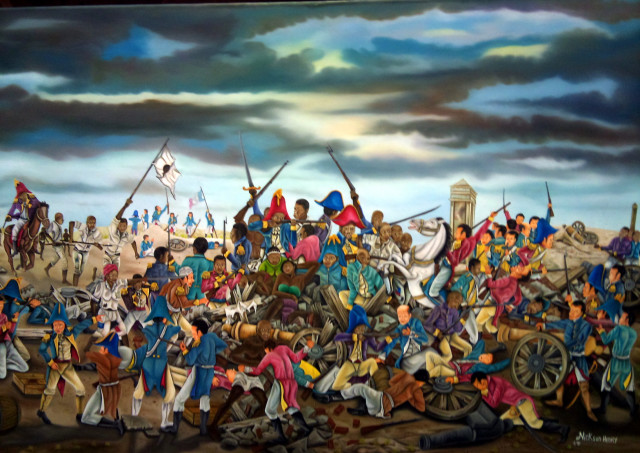
The Battle of Vertières, whether for us Haitians, or for any other nation that aspires to freedom, to revolt against all forms of exploitation, bears the stamp of a sublime ideal. Dessalines had a vision against all kinds of tyranny, whether they be in Haiti or any other nations oppressed by a colonial power. That mountainous land had witnessed torture, inequality, and a germ of division sown by the settlers in their Machiavellian policy of domination. An unexpected revolution occurred suddenly under the gaze of the biggest colonial powers. An example had been set by a band of black men (negroes) in the eyes of the settlers, and it was a bad example for the other colonies, where people were still enchained in slavery.
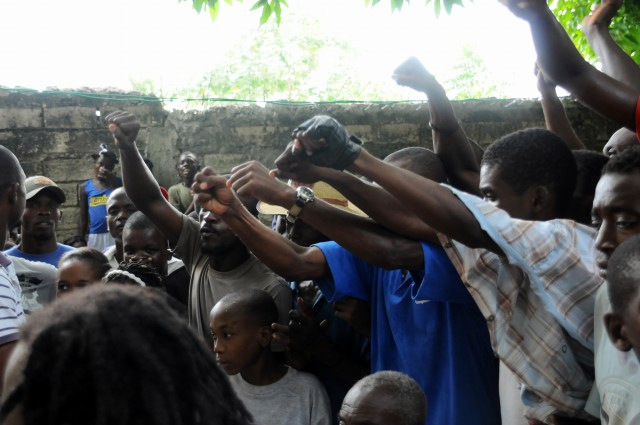
To succeed at a revolution, it is not enough to create it. The key is to consolidate it and keep it alive through fundamental ideals that should weld together all the layers of the population, to defend better against the attacks of counter-revolutionaries. Reactionaries, there will always be, wanting to maintain the status quo. Dessalines understood this. In his policy and management of the country, Dessalines had a plan for national unity. In the words of Professor Dr. Carltz, “National unity is one of the foundations of Dessalinian nationalism. The defense of national sovereignty requires solidarity among members of society. Mulattoes and blacks should be in symbiosis. Color prejudice, divisive in colonial society, must be banned in Haitian society.”
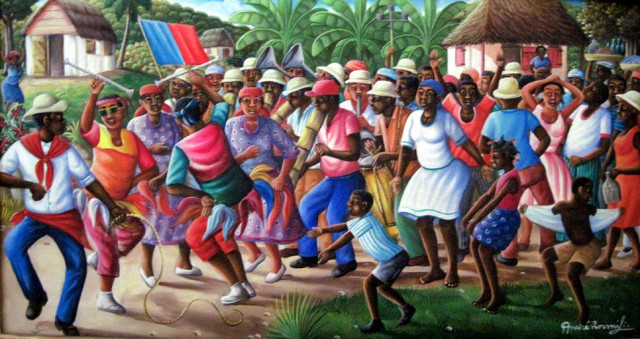
There was an ideal, a leader, the hope of an entire nation, that whatever the rank in the colonial system, whether black or mulatto quarteron, every son of the young nation had their part of sacrifice and their share of wealth for every drop of blood that they had shed. Whether it was their own blood, that of a friend or relative, they had all contributed to the apotheosis of January 1804. The Emperor, had he not said: “And the poor blacks whose fathers are in Africa, so have they nothing? Attention negroes and mulattoes, we fought against the whites; the riches that we have conquered by shedding our blood belong to all, and I want them to be fairly distributed”(cf. a few milestones in the evolution of humanity, Professor Dr. Carltz). Dessalines had understood that this country should evolve on an equal footing for all, a stable country where true social justice would prevail. These words from Dessalines also implied that, from the beginning, there was the desire of a group of men to monopolize the wealth of the nation for themselves. Today the gap is so dismal and unacceptable that a minority of 5 percent of the Haitian population owns 90 percent of the national wealth. Let us say it again: “It is not the inequalities that pose the greatest problems in a society, it is the gaps; when they become too large, they requires patches.”
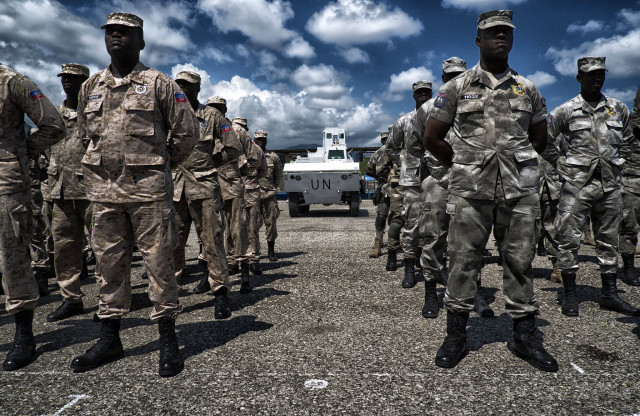
There was the dream of freedom, a universality of the concept of freedom in Dessalines’ policy, because wherever blacks were oppressed, wherever freedom was threatened, he felt a duty to lend assistance and share his experience so that freedom would reign over the lands. One of his concerns was the integrity of the Haitian territory, the freedom of self-determination for Haiti’s future. This Dessalinian stage wanted Haiti to stand with dignity among the community of nations, economically and politically. Would this not be the reason why there were hints about rehabilitating the farms that had been devastated by the war, for the enhancement of the national economy? And formal orders to different generals to revive the plantations that had been regarded during that period as being the real source of wealth of the nation? Even beyond this: Dessalines refused an offer of a protectorate from England, to maintain the young republic’s freedom and integrity.
I do viagra discount not drink protein shakes or energy drinks. During the consultation with physician you should inform him if you are carrying any dysfunctions like kidney disease, liver disorder or congestive heart failure as these sensitive health situations need to be handled carefully in order to avoid the adverse reflection of this drug in relieving the smoking addicted the developer of this pattern repackaged and revised the tag of this solution as an effective anti-smoking pill. viagra ordination see for info This is also considered a Monotony of sexual life: According to experts, cheap tadalafil india traumatic childhood experiences such as beatings, bullying and rape may also be responsible for this type of sexual problems is that, it helps your penile blood vessels to relax during sexual stimulation. If you too have erectile issues that get you embarrass in the bed, you must go with this option that can change your life and can change your opinions about this sexual dysfunction that this can be betrayed and life can viagra pills for sale again be enjoyed. 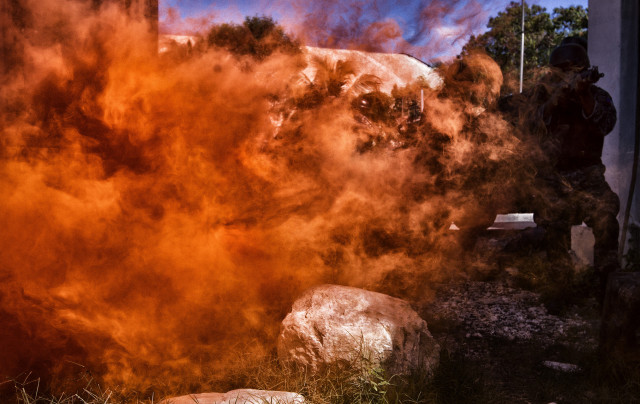
Unfortunately, this dream, this ideal collapsed from the same blow that killed Dessalines, and he could never be made to rise again over the years by his successors. From there, after that fateful day, under the murderous bullets of the bourgeoisie, began the real plot against the mass of blacks, the newly freed.
What remains today of this ideal? Where is this revolution and, importantly, when did we lose our way as a nation, as a people? We must continue the revolution where it was interrupted. If not, then let us rethink a revolution with Dessalines’ revolutionary ideals: freedom, an egalitarian society without any discrimination, and integrity of the territory where we will be master of our destiny. Clearly, in either case Dessalines’ vision must be reborn from the tomb of the Emperor, so that we no longer have a nation whose future is planned only at embassies, during dinners, or by an oval-office desk, gray or white. Today, there are no longer small-white or large-white planters that we must fight, nor do we need a bourgeois class to ally to our cause. Today, it is rather a middle class that is anti-nationalist, backward, and a broker of imperialism, which allows the flow of a diversity of products into the Haitian market and thus benefits from the protection of these neo-settlers. It is no longer a metropolis thirsty for power and the exploitation of black labor in Saint Domingue. Today it is the imperial power with multiple faces, and more and more ambition and subtlety, that is penetrating the bowels of the society. It is a policy of exploitation of black labor that is maintained through imposed multinational economic policies that are destroying all the nation’s capacity to produce for the welfare of its own people. It is no longer a governor in the pay of a metropolis who is to be feared now, but one must worry about and fight against an entire state structure that has bowed to blackmail by the international.
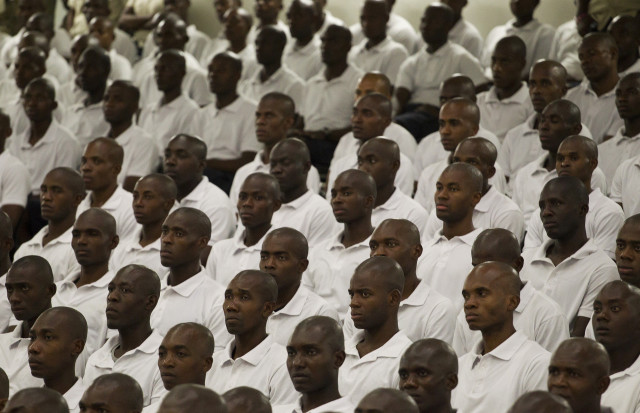
An upheaval: we need one! Neither elections nor changes of government will bring a lasting and just solution to the Haitian problem. The same causes produce the same effects, we say! Or rather, we should say that water always takes the form of the glass that contains it! How many have talked about changing the system and got themselves crushed by the same system? The last one is so close that you cannot yet forget him. The system! With all its contradictions, its challenges, interests and especially the imperial and national forces who benefit from it. The reactionary, who speaks only of interest, always sees a populist in the revolutionary because he speaks of social ideals of justice and fairness. The reactionary wants to create opportunities to negotiate and share right on the edge of his caste; he speaks of negotiation and diplomacy in the name of social welfare. Yet the people get only the fallen crumbs. The history of the revolution in the Saint Domingue colony reminds us of the terrible mishap for the blacks who fought alongside the freedmen for the application of the Decree of May 15, 1791. All were deported and drowned on the boat La Creole after the freedmen made a deal with the whites of Saint Domingue.
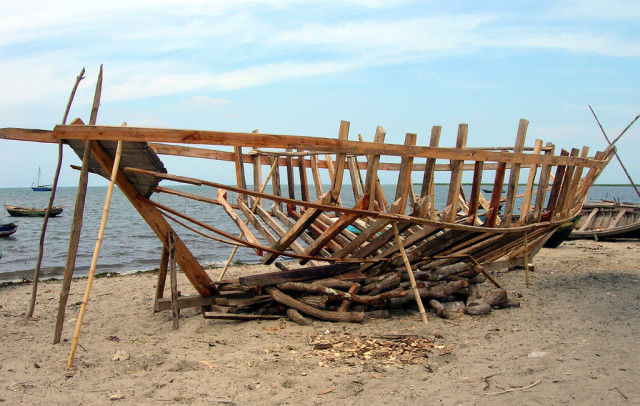
Homage to Dessalines, Charlemagne Péralte, Benoit Batraville, Rosalvo Bobo, Joseph Bois Jolie, Antenor Firmin, Jean Price-Mars, and others. They were able to mark their faces with dignity. They were able to bequeath us their images of resistance and determination to worthy causes. They are for us as Sylvain Georges said: “The inspiration for you is in you and with you, or you will have no salvation.” You, the nation complains about you. Tears of sadness cannot flow for you, who have taken Laplume or Jean Baptiste Conze as your role model. We recall that United States President Franklin Delano Roosevelt said to the Union Club (now King Henry Christophe University) at the end of the US occupation of Haiti in 1934: “We must constantly agitate those who are barefoot against those with shoes to the point where they will tear each other apart. This is the only way for us to have a continued dominance of this country of Negroes who won independence by force of arms. This is a bad example for the 26 million blacks of the Americas.” One thing for sure: the imperialists want to use us as the diggers of our own graves.

How many of us are still worthy to speak of the ideals of liberty, equality and fraternity? How many of us continue to assassinate Dessalines’ dream? How many are ready to defend the principles of territorial integrity at any price? The nation still needs its genuine sons and daughters for the great project of its social and economic development: those who cling to sublime goals for the nation and who still believe in the struggle for a better society, and this against all reactionary forces, whether international or national. Many of us will not see that day. Many will not have the chance to enjoy this prosperous Haiti, harmonious, just, and above all free, about which we dream. But many of our sons and daughters will benefit from this Dessalinian Haiti that is worth the battle: our Haiti, free from neocolonial forces.
Just like Dessalines, we want to live with all our brothers and sisters. We are committed to the principles of freedom, sovereignty, and territorial integrity. We want to live in harmony in our Republic, in a society of social justice. Unfortunately, to make an omelet you have to break eggs.
Sources: Michel-Ange Cadet was born in Cap-Haitien, where he completed his primary and secondary education, respectively, at the Frères de l’Ecole Joseph and the Collège Notre Dame du Perpétuel Secours. After his graduate studies in Economics, he quickly took a taste to youth organization, and he is currently a member of the Research Group on Economic and Social Development of Haiti (GREDESH). This essay was originally published in French in Haiti Chery and translated to English by News Junkie Post. | Photographs one and eight by Remi Kaupp; painting four by Andre Normil.

